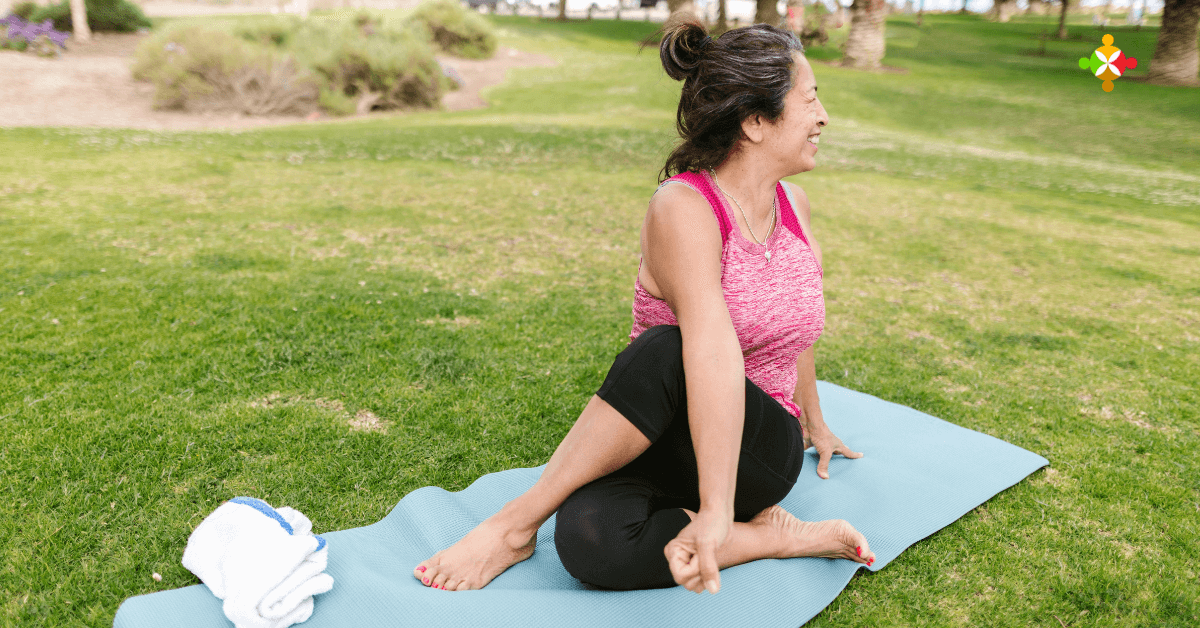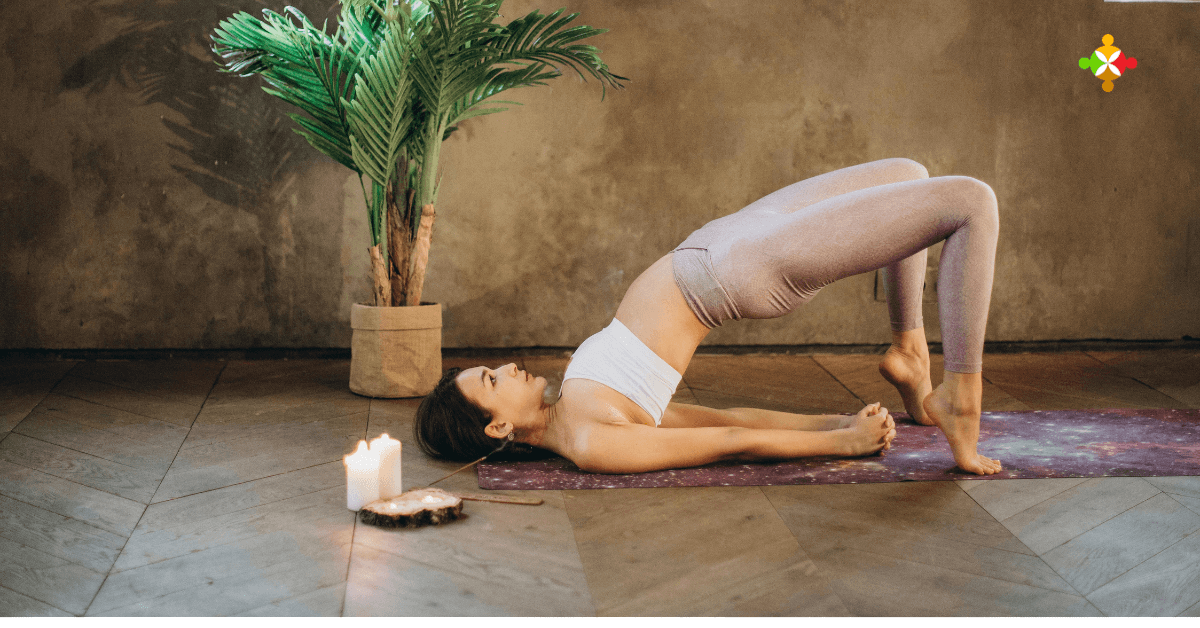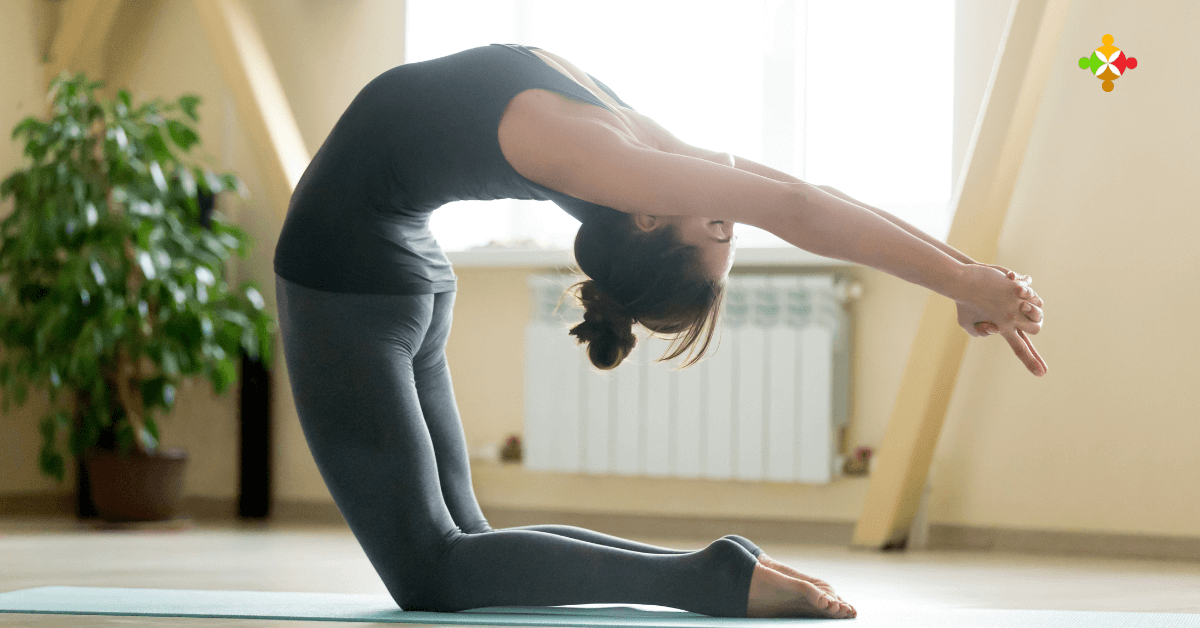
Asthma is one of the most common chronic conditions worldwide, affecting approximately 262 million people, according to the World Health Organization (WHO). According to the CDC, approximately 25 million Americans have asthma, which is about 1 in 13 people in the U.S.
Despite advances in medical treatment, asthma remains a significant health concern, causing over 400,000 deaths globally each year. Managing asthma can be challenging, leading many to explore alternative therapies like yoga, which is gaining recognition for its potential to improve respiratory health.
But how exactly does yoga help with asthma management? This blog delves into the research, benefits, and best yoga poses for asthma relief to help you understand how this ancient practice can support modern respiratory care.
What is Asthma?
Asthma is a chronic, diverse respiratory condition characterized by inflammation and airway hyperreactivity, leading to symptoms such as wheezing, coughing, and breathlessness. It involves not just a singular reaction but a complex interplay of environmental triggers and genetic factors. During an asthma attack, the lining of the airways swells and the muscles around them tighten, reducing air flow and making breathing difficult. This can be triggered by allergens, exercise, cold air, and other stressors. Asthma's variability in intensity and symptoms requires a nuanced approach to management and understanding, setting the stage for the benefits of complementary therapies like Yoga.
Common symptoms of Asthma
Asthma manifests through a variety of symptoms that can significantly affect an individual's daily life and well-being. The most common symptoms include:
- Persistent Coughing: Often worsened by viral infections or exposure to cold air or allergens, this can be distressing and exhausting, especially when it becomes chronic and interferes with sleep.
- Wheezing: A high-pitched whistling sound when breathing, particularly noted during exhalation, is a hallmark of narrowed airways in asthma.
- Shortness of Breath: People with asthma often experience feelings of being unable to breathe deeply enough, which can be particularly alarming during physical activity or at night.
- Chest Tightness: This symptom can feel like a squeezing or heavy pressure around the chest area, often exacerbating feelings of anxiety and distress during an asthma attack.
These signs and symptoms can fluctuate in severity, often worsening during the night or early morning, making it difficult to sleep and function during the day. Exercise, cold air, and allergens can also trigger these symptoms, impacting an individual’s ability to engage in physical activity without discomfort.
Meet the Experts: Leading Figures in Asthma Research
The field of asthma management and respiratory health is rich with experts whose research has significantly advanced our understanding and treatment of respiratory conditions.
Dr. John B. West, a professor of medicine and physiology, is renowned for his extensive research on the mechanics of lung function and respiratory physiology. His seminal work on how the lungs operate at extreme altitudes has implications for understanding the limits of human breath under stress, a key consideration in managing asthma which often manifests in breathing difficulties under physical stress.
Dr. Peter G. Gibson, another pivotal figure, serves as a professor of respiratory medicine. His research focuses on the mechanisms and treatments of airway diseases, particularly asthma. Dr. Gibson's work on inflammation and responsiveness of airways has led to better therapeutic strategies that are tailored to individual patient needs, highlighting the importance of personalized medicine in asthma care.
In yoga therapy, Dr. Sundar Balasubramanian is a pioneering researcher who has dedicated his work to studying the benefits of yogic breathing practices on respiratory health. A biologist by training, Dr. Balasubramanian's research demonstrates how yoga practices such as Pranayama (controlled breathing) can significantly improve pulmonary function, reduce stress, and enhance the life quality of those with respiratory issues. His studies provide scientific backing for the use of specific yogic techniques in the management of asthma, offering a complementary approach that can be integrated alongside conventional treatments.
These experts collectively underscore the importance of a multidisciplinary approach in managing asthma. Their work not only advances our scientific understanding of asthma but also enriches clinical practices by incorporating holistic methods such as yoga. This integration helps in crafting comprehensive treatment plans that address both the physiological and psychological aspects of asthma, ensuring a broad-spectrum approach to health and well-being for patients with respiratory challenges.
How can Yoga help in Asthma?
Yoga has proven to be a powerful complementary therapy for managing asthma symptoms. By focusing on controlled breathing, relaxation, and improving overall lung capacity, yoga can assist asthma patients in gaining better control of their condition. Below are some of the ways yoga can benefit individuals with asthma:
1. Reduces Stress and Anxiety
Stress is a common trigger for asthma attacks, and yoga’s focus on mindfulness, meditation, and relaxation can help lower stress levels. Techniques such as Corpse Pose and meditation activate the parasympathetic nervous system, promoting relaxation and reducing asthma exacerbations.
2. Improves Posture and Lung Capacity
Yoga postures like Mountain Pose and Cobra Pose help open up the chest, strengthen the muscles around the lungs, and improve overall posture, allowing for better lung expansion. Poor posture can compress the lungs, making breathing more difficult for asthma patients.
3. Relaxes the Airways
Yoga incorporates gentle poses and breathing techniques that help relax the muscles around the bronchial tubes, easing the symptoms of airway constriction common in asthma. Poses like Easy Pose promote relaxation, which helps open up the airways.
4. Strengthening the Respiratory Muscles
Through pranayama and specific poses, yoga strengthens the respiratory muscles, making breathing more efficient. This can be particularly beneficial for asthma patients who tend to develop shallow breathing patterns during asthma attacks.
5. Calming the Immune System
Asthma is often triggered by an overactive immune response, leading to inflammation in the airways. Yoga helps regulate the immune system by lowering stress hormones and reducing inflammation, which in turn reduces the risk of asthma flare-ups.
Clinical studies done on Yoga for Asthma
Clinical studies investigating the efficacy of Yoga therapy in managing asthma have garnered significant attention in recent years, with a growing body of research highlighting its potential benefits. Numerous studies have contributed to our understanding of how Yoga can complement traditional asthma treatments, offering insights into its effectiveness in improving lung function and symptom management.
Here we are summarizing the findings of a few of these studies:
A preliminary clinical trial by the Ethiopian Journal of Health Sciences indicated that strengthening respiratory muscles through yoga breathing exercises helped patients improve their breathing patterns and reduce the severity of asthma attacks.
According to a study by The Cochrane Library, breathing exercises can positively impact quality of life, reduce hyperventilation symptoms, and improve lung function in adults with mild to moderate asthma.
The study published by Journal of Ayurveda and Integrative Medicine concluded that appropriately chosen yoga practices can be highly effective in the long-term management of asthma. Participants experienced significant improvements in their quality of life, a reduction in the frequency of weekly asthma attacks, and decreased reliance on medication.
Overall, the cumulative evidence from these studies underscores the potential of Yoga as a complementary approach to asthma management, offering individuals with asthma additional tools to improve their respiratory health and overall well-being. As research in this field continues to evolve, further exploration of Yoga's mechanisms of action and its long-term effects on asthma outcomes will be essential for optimizing its clinical utility.
Best Yoga Poses for Asthma Relief
The goal of yoga in managing asthma is to open the chest, strengthen the respiratory muscles, and promote deep, mindful breathing. Techniques like alternate nostril breathing and bee breath are highly beneficial in regulating and deepening the breath, which can help manage the symptoms of asthma.
In addition to these techniques, here are some of the most effective yoga poses for asthma relief:
1. Easy Pose

This simple seated pose, paired with deep breathing exercises, is an excellent way to center your breathing. Easy pose helps lengthen the spine and expand the chest, allowing more air into the lungs. Practicing slow, diaphragmatic breathing in this pose can increase lung capacity and improve oxygen flow.
2. Seated Twist

A seated twist helps open the chest and improve the flexibility of the thoracic spine, creating more space for the lungs to expand. By enhancing lung function, this yoga pose helps clear congestion and eases the sensation of breathlessness that asthma sufferers often experience.
3. Cobra Pose

Cobra pose is perfect for expanding the lungs and chest, improving respiratory function. This pose strengthens the muscles around the lungs, improves circulation, and stimulates the abdominal organs, which can assist in reducing asthma attacks triggered by poor digestion or stress.
4. Bridge Pose

Bridge pose actively opens the chest and lungs, providing significant relief from respiratory discomfort. It stretches the chest, neck, and spine, and by lifting the chest upward, it helps reduce the strain on your lungs, allowing for deeper, smoother breathing.
5. Camel Pose

Camel pose is particularly beneficial for asthma as it opens the chest, stretches the abdomen, and activates the diaphragm. This pose improves lung capacity, making it easier for individuals with asthma to breathe more deeply. It also helps calm the nervous system, reducing stress, which is a common trigger for asthma attacks.
Combining these various yoga poses and breathing exercises in a structured and consistent routine can provide individuals with asthma a comprehensive approach to managing their condition, promoting respiratory health, and enhancing overall quality of life.
How to find a qualified Yoga Instructor for Asthma
When seeking a qualified Yoga therapist to assist with asthma management, it's crucial to prioritize practitioners with specialized training in respiratory health. My Yoga Network offers a convenient platform for connecting with certified Yoga therapists who possess extensive experience in addressing asthma concerns. These professionals undergo rigorous training to understand the intricacies of respiratory conditions, enabling them to tailor Yoga sessions to suit the individual needs of asthma patients.
By engaging with a certified Yoga therapist through My Yoga Network, you gain access to a network of experts who are proficient in crafting personalized Yoga routines designed to alleviate asthma symptoms and mitigate triggers. These therapists possess a deep understanding of the physiological and psychological aspects of asthma, allowing them to develop comprehensive treatment plans that promote respiratory health and overall well-being.
Whether you're seeking relief from wheezing, shortness of breath, or stress-related asthma triggers, the specialized expertise of these Yoga therapists can offer valuable support. Through targeted breathing exercises, gentle stretches, and relaxation techniques, they empower individuals to manage their asthma effectively and enhance their quality of life.
What questions to ask Yoga therapist for Asthma
When selecting a yoga therapist for asthma management, asking the right questions ensures you receive personalized care. Here are some key questions to consider:
What is your experience in working with asthma patients?
Ask about their knowledge of breathing techniques and yoga poses that target respiratory health.
How do you customize your sessions for someone with asthma?
Ask how they modify poses and breathing techniques based on the severity of your symptoms and any other health conditions you may have.
What are the expected benefits of yoga for asthma?
Gain clarity on how yoga may improve your symptoms and overall respiratory health.
How often should I attend sessions, and how long will each session be?
Understand the recommended frequency and duration to ensure consistency in your practice.
What qualifications and training do you have in yoga therapy and respiratory health?
Inquire about their certifications and education to verify they have the expertise to address your specific needs.
How do you integrate yoga with other asthma management strategies, such as medication or lifestyle changes?
Ask how yoga can complement your current asthma treatment plan for a holistic approach.
What are the logistics of your sessions (scheduling, location, cost)?
Confirm practical details to ensure the sessions are convenient and accessible for you.
Conclusion
Incorporating Yoga into your asthma management strategy can provide significant benefits that enhance physical health and overall well-being. Through My Yoga Network, you have access to experienced Yoga therapists who can tailor practices to your specific needs, offering a comprehensive approach that complements traditional medical treatments and supports long-term health improvements.
Resources
- Understanding Asthma Attacks and Management: Link
- Clinical Effects of Yoga on Asthmatic Patients: A Preliminary Clinical Trial. Ethiop J Health Sci.: Link
- Yoga for bronchial asthma: a controlled study. Journal of Asthma: Link
- Yoga based guided relaxation reduces sympathetic activity judged from baseline levels. BMC Complement Altern Med. 2002: Link
- Design and implementation of a highly efficacious new yoga breathing and relaxation protocol for asthma: A discussion and summary. J Ayurveda Integr Med: Link